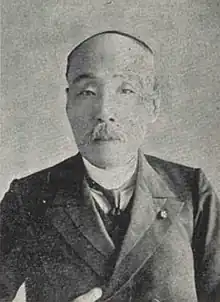Yi Yun-yong (general)
Yi Yun-yong (Korean: 이윤용; Hanja: 李允用; 5 September 1855 – 8 September 1938) was an Imperial Korean official and general. He is considered as a collaborator to Imperial Japan or Chinilpa.
Yi Yun-yong | |
|---|---|
 | |
| Minister of Military | |
| Monarch | Gojong |
| Preceded by | Cho Hui-yeon |
| Succeeded by | Min Young-hwan |
| Personal details | |
| Born | September 5, 1855 Pyongyang, Pyongan Province, Joseon Dynasty |
| Died | September 8, 1938 (aged 83) Korea under Japanese rule |
| Profession | Official, and Officer |
| Military service | |
| Allegiance | |
| Branch/service | |
| Years of service | 1896-1907 |
| Rank | Lieutenant General |
Biography
Yi was born on 24 July 1855 (Lunar Calendar) in Pyeongyang.[1] He was posted to Yijo as a member of Don-Nyeong Bu in 1868.[2] A year after, Yi appointed as Byeolgunjik, then Minister of Economy in 1894.[1] Same year, he was appointed as the chief of police. During his term, he oppressed Yi Jun-yong's coup, making Heungseon Daewongun to despise him.[3] Yi was one of those who rose to high position despite being a seoeol.[4] After the assassination of Empress Myeongseong, Yi was considered as an anti-Japanese politician and lost his position with Ye Wanyong, Yi Bum-jin, and Min Sang-ho.[5] Furthermore, his participation in the Chunsaeng Gate incident made him to exile to the American legation with other pro-American politicians.[6] Later, he transformed into a pro-Russian politician and led Gojong's internal exile to the Russian legation.[3] Like his younger brother, he was a supporter of the Independence Club, that he sponsored building Independence Gate.[7] In October 1896, Yi received Dmitry Putyata as Russian instructors. He requested them to train 2,200 Korean personnels. Soon, Min Young-hwan, who actually brought these instructors, replaced him as the next Minister of Military.[8] Other than being an official, Yi was also a businessman. In order to protect the rights of navigation in Incheon, Yi established a shipping firm. This enterprise was the first Korean shipping company had total of 5 ships that interconnected many Korean ports.[9] During the Russo-Japanese War, however, four of the ships of the firm were exploited by Japanese for transporting their forces or their supplies.[10]
However, by late 1900s, Yi became a pro Japanese collaborator. In 1909, Yi negotiated with growing Righteous army and lobbied them with 200,000 Won. He joined numerous pro Japanese organizations such as the GukCi Yushidan. After the annexation, Yi received title of Baron from the Japanese government. He continued his life as a pro-Japanese collaborator. He joined many pro-Japanese organization; Yi became an instructor of Buddhism Ongho Organization in 1917, and Daejeong Chinmok Hui in 1921. On 2 November 1928, Yi was appointed as a member of Jungchuwon of Japanese colonial government, and received 3,000 Won each year. He died in 1938, and his grandson received his title as baron.[1]
References
- "이윤용(李允用)". encykorea.aks.ac.kr (in Korean). Retrieved 26 March 2023.
- Sungjeongwon Ilgi. "이조가 돈녕부 봉사에 이윤용을 단부하였다".
- "이윤용". terms.naver.com (in Korean). Retrieved 4 June 2023.
- 신편한국사. "(3) 서얼의 정치·경제적 지위향상과 사회참여".
- 신편한국사. "1) 제3차 개혁의 배경".
- 국사관논총. "Ⅰ. 日本强勢期(1894〜1896) : 美國의 對韓 不介入政策".
- 신편한국사. "1) 독립기념물의 건립".
- 신편한국사. "(5) 군사·경찰제도".
- 국사관논총. "1. 인천과 부산의 해운업".
- "대한협동우선회사(大韓協同郵船會社)". encykorea.aks.ac.kr (in Korean). Retrieved 11 August 2023.